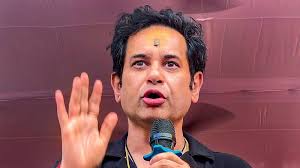Pradyot Kishore denied audience with Gomati district magistrate; TIPRA Motha and CPM condemn him

In Tripura, Pradyot Kishore Deb Barman, leader of TIPRA Motha, was recently denied a meeting with the Gomati district magistrate. This refusal immediately sparked strong criticism from both TIPRA Motha and the Communist Party of India (Marxist) (CPM).
The Incident
Pradyot Kishore had requested a discussion on key issues such as tribal welfare, land rights, and development projects. However, officials at the Gomati district magistrate’s office rejected his request without providing a clear explanation. Many observers viewed this as an attempt to block a prominent indigenous leader from raising urgent concerns.
TIPRA Motha’s Reaction
Unsurprisingly, TIPRA Motha called the denial “undemocratic” and “unacceptable.” According to a senior party official, “Pradyot Kishore represents thousands of indigenous people. Denying him a meeting shows disregard for their voices.” The party also emphasized that the issues Kishore wanted to address are critical. Therefore, they urged the administration to reconsider and open a dialogue promptly.
Moreover, TIPRA Motha has long been advocating for greater autonomy and land protections under the Tripura Tribal Areas Autonomous District Council (TTAADC). This refusal could seriously hinder progress on these fronts.
CPM’s Criticism
Interestingly, despite political rivalry, the CPM joined TIPRA Motha in condemning the decision. They argued that restricting access to political leaders undermines democratic norms and reduces transparency in governance. A CPM spokesperson remarked, “Denying access to elected representatives harms the principles of open dialogue.”
Their support highlights the seriousness of the issue. Both parties agree that open communication between officials and leaders is essential.
Political Context
TIPRA Motha’s growing influence in Tripura’s tribal areas has challenged the established political order. The party pushes strongly for indigenous rights and development, and Pradyot Kishore’s leadership has brought renewed focus to tribal identity and land issues.
Consequently, this incident reflects ongoing tensions between the administration and emerging tribal leadership. It raises broader questions about the government’s willingness to engage with groups demanding change.
Views from Civil Society
Beyond politics, local tribal activists and community members expressed concern about the denial. They stressed that dialogue with leaders like Kishore is vital for resolving grassroots problems. A community leader from Gomati noted, “Blocking meetings only deepens mistrust between the government and indigenous people. Open talks are essential.”
Therefore, many believe that denying such meetings could damage the relationship between the administration and the tribal communities.
Calls for Clarity and Dialogue
Both TIPRA Motha and CPM have demanded that the government clarify why the meeting was denied. Furthermore, they called on officials to uphold democratic values by ensuring elected leaders can communicate freely. Ignoring representatives risks weakening governance and accountability.
What Happens Next?
So far, the Gomati district magistrate’s office has not issued an official explanation. Political observers are watching closely how the government will respond. Meanwhile, TIPRA Motha and CPM insist on continuing dialogue with district officials.
If handled carefully, this incident could lead to improved cooperation. On the other hand, ignoring the issue might fuel political tensions further. Ultimately, this episode highlights the delicate balance between political demands and government actions in Tripura.






